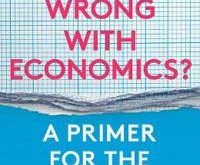The German parliament today, after heated debate, approved the much discussed debt package worth hundreds of billions of euros for defence and infrastructure. With the necessary two-thirds majority, the parliament in Berlin passed a constitutional amendment allowing defence and security expenditures to be exempt from the Schuldenbremse (debt brake). The previously strict debt rules for the federal states will also be relaxed. Better late than never. Keynes is alive and...
Read More »What’s wrong with economics — a primer
What’s wrong with economics — a primer This is an important and fundamentally correct critique of the core methodology of economics: individualistic; analytical; ahistorical; asocial; and apolitical. What economics understands is important. What it ignores is, alas, equally important. As Skidelsky, famous as the biographer of Keynes, notes, “to maintain that market competition is a self-sufficient ordering principle is wrong. Markets are embedded in...
Read More »Krigskeynesianismens återkomst
I Sveriges vassaste ekonomipod — Starta pressarna — diskuterades igår socialdemokraternas utspel om att inrätta en ny ‘Totalförsvarsfond’ om minst 250 miljarder kronor som ska göra det möjligt att tidigarelägga investeringar och påskynda utbyggnaden av Sveriges försvar. På många sätt är detta så klart ett bra förslag — men också lite sorgligt att det skulle till en galen USA president och krigshot för att socialdemokratins ledning skulle ta sitt ‘statsbudgetförnuft’ till...
Read More »Finding Eigenvalues and Eigenvectors (student stuff)
Finding Eigenvalues and Eigenvectors (student stuff) .[embedded content] When applying principal component analysis in econometrics courses we often want to reduce data dimensionality. Eigenvalues and eigenvectors help us do that. In macroeconomics — especially when we use dynamic programming and Bellman equations to solve optimization problems — eigenvalues and eigenvectors help us determine convergence and stability properties. So — good to have at least...
Read More »The pretence-of-knowledge syndrome
from Lars Syll What does concern me about my discipline, however, is that its current core — by which I mainly mean the so-called dynamic stochastic general equilibrium approach — has become so mesmerized with its own internal logic that it has begun to confuse the precision it has achieved about its own world with the precision that it has about the real one … The dynamic stochastic general equilibrium strategy is so attractive, and even plain addictive, because it allows one to generate...
Read More »Släpp skuldbromsen!
Den tillträdande tyska förbundskanslern, kristdemokraten Friedrich Merz, har tillsammans med sin tilltänkta koalitionspartner annonserat en uppgörelse om att utnyttja parlamentets två tredjedels majoritet – förutsatt att de får med sig de Gröna – för att släppa på skuldbromsen. Syftet är att finansiera försvarssatsningar över 1 procent av BNP samt att skapa en infrastrukturfond på svindlande 5000 miljarder euro under tio år. Merz har också föreslagit att EU ska undanta...
Read More »The pretence-of-knowledge syndrome
What does concern me about my discipline, however, is that its current core — by which I mainly mean the so-called dynamic stochastic general equilibrium approach — has become so mesmerized with its own internal logic that it has begun to confuse the precision it has achieved about its own world with the precision that it has about the real one … The dynamic stochastic general equilibrium strategy is so attractive, and even plain addictive, because it allows one to generate...
Read More »Trying to explain tariff incidence to MAGA supporters
Trying to explain tariff incidence to MAGA supporters .[embedded content]
Read More »Tyskland lättar på skuldbromsen — och Sverige bör följa efter!
Tyskland lättar på skuldbromsen — och Sverige bör följa efter! .[embedded content] I Tyskland har den så kallade Schuldenbremse (skuldbromsen) varit en central del av den ekonomiska politiken sedan år 2009. Regeln begränsar hur mycket staten får låna, med syftet att hålla den offentliga skulden låg. Kruxet med regeln har dock varit uppenbar — den hindrar nödvändiga investeringar i infrastruktur, grön omställning och välfärd. Sverige har med sitt på senare...
Read More »How economists forgot the real world
How economists forgot the real world The book’s argument is that in straining to peer through the chaos and confusion of the world to the underlying mechanisms, too much economic thinking, both in Ricardo’s day and ours, mistook a small, unrepresentative sample as the whole picture. This has distorted the vision of generations. If your scientific ideal is a simple, logical model, there is a tendency to focus on those parts of reality that are more regular...
Read More » Heterodox
Heterodox





